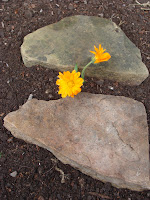

I am pretty wild about Peter Carey's latest novel. I've been stuck on the same passage for a few days, not because I'm sleepy while reading and so forced to go back and re-read the same sentence over and over and not because it's been so long since I picked the book up that I can't remember what's going on.
No, it's just that the passage is so delightful that I can't get enough of it, so I keep reading it and enjoying the words so much. Below I indulge my taste for copying out parts that I love, enjoying the process of making the words on the page, so you can taste it, too.
Thanks to the marvel of the interwebs, I have been cautiously reading a little about the book, watching BBC interviews with the author, reading Ursula LeGuin's review. Cautiously because I don't want other people's opinions in my head just yet, also no spoilers, please. And it's pretty cool to read what Peter Carey himself was
reading while writing the book.
Which is how I realized that I don't know shit about
Alexis de Tocqueville, a chief source of the novel's story. Surely we covered this in AP US History?
Really, I should know who he is, and yet realized with a start this morning that I don't remember a thing. Don't know shit. Which matters and yet doesn't, because that same interwebs can just tell me what I need to know. So great that we don't have to hold everything in our capacious yet challenged brains.
I'm on page 96 and already fearing the end on page 380, not wanting this adventure to end. If you haven't read Peter Carey, "Parrot and Olivier in America" is a fine place to start. Squiddy soul: so wonderful!
* * * * *
I touched Mathilde’s bare shoulder, and gently drew back her hair.
“Go,” she cried. “Just go.”
“I’m not going anywhere.”
She did not look at me but went to our bed, picked up my trousers, and threw them down into the street.
“What have I done?”
She was my treasure, my ball of pain and beauty – her luminous eyes, her curved little belly, her perfect thigh. Who she was fighting I did not know, but I was old enough, had scars on my ankles and my arms, a piece missing from my ear, and saw how the moment had come, like an unexpected death, like God striking, the lightning hitting, and I was a man tipped from his bunk on the ship to find not floor but death water, bubbles, the fierce cold fingers of the salty night. There, die. Rise no more.
There was no point in asking is it fair that I should lose everything I love again. I took my duffel and threw in my tools, my better clothes, a book, and with no word to Maman I made off down the giddy seasick stairs, emerging half naked into the courtyard where the children were already playing with the trousers, from whose pockets all coin, even my good-luck acorn, was gone. It had taken only ten minutes to have my body flayed, my bones stripped clean, my squiddy soul out in the sun to dry.
I headed for my English printers, for where else could I go? The day was sunny and cruelly pleasant. Along the way I spied, in every café, the sweet familiarity of couples who had spent the night happily in each other’s arms and I, who had been for six years one of them, was cast beyond the pale, a poor lonely foreign wretch. I found my friends all gone to work, and the landlady, who had always been so pleasant to me, said her house was full. Reluctantly she brought me some bottled ale and wrote the tab on my friend’s account.
Then I removed to a hotel on the rue Richelieu, where, on the strength of Monsieur’s famous name and my good clothes – which I was forced to lay out on the bed – I was given, for twelve francs every month, a “parlor next to the sky.”
It sickens me to tell the rest, my many trips back to the faubourg Saint-Antoine where Mathilde finally softened enough to lend me a hundred sous. There is little that is not pathetic but in the end, no matter what injustice he suffers, a man is still a man and cannot be a sniveling wretch forever, and I set out, at an age when one expects this shit to be well past, to present myself at the petite maison, declaring myself ready to travel to America or Hell, whatever would remove me from my present state.



















